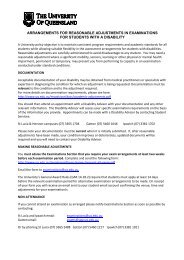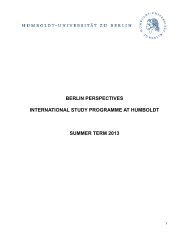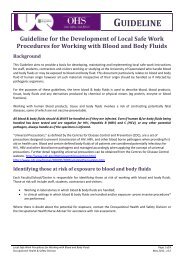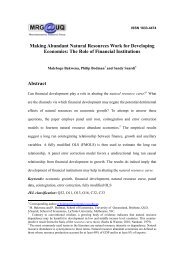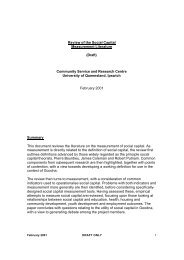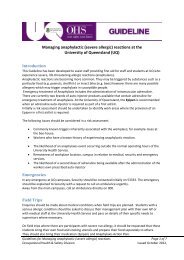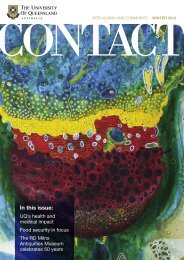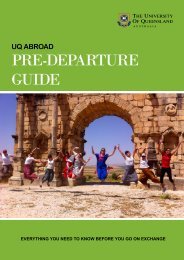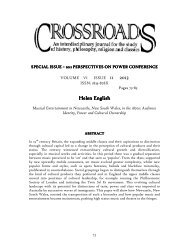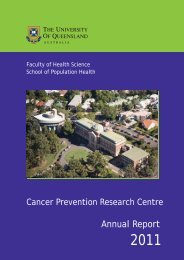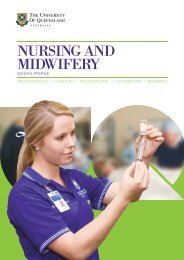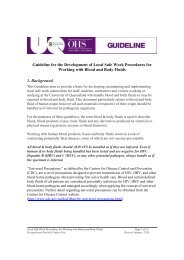alumni news - University of Queensland
alumni news - University of Queensland
alumni news - University of Queensland
You also want an ePaper? Increase the reach of your titles
YUMPU automatically turns print PDFs into web optimized ePapers that Google loves.
keep in contact<br />
1988<br />
Settlement story<br />
Barry Levy<br />
Graduate Diploma in Education<br />
Barry Levy has recently published his third<br />
book in seven years while continuing to work<br />
for the <strong>Queensland</strong> Tertiary Admissions Centre<br />
as a publications editor.<br />
His latest book, Shades <strong>of</strong> Exodus<br />
(Interactive Publications) is a fictional view<br />
on migration from a South<br />
African perspective, though<br />
its themes are intended to be<br />
universal.<br />
Mr Levy himself worked in<br />
South Africa as a <strong>news</strong>paper<br />
journalist from 1974, before<br />
emigrating to Australia 10<br />
years later.<br />
He said he had always<br />
planned to return to South<br />
Africa once Apartheid ended,<br />
but, by that time, his two<br />
children and Australian-born<br />
wife, Gael, were happily<br />
settled in Brisbane.<br />
“Thousands <strong>of</strong> South<br />
Africans have been arriving<br />
in Australia, particularly since 1994, many <strong>of</strong><br />
them coming to live in <strong>Queensland</strong>,” he said.<br />
“My latest book is a soul-searching portrait<br />
<strong>of</strong> South Africans who have emigrated to<br />
Australia, a country where a fair few arrive<br />
considering themselves ‘above the bunch’,<br />
only to find they have to start, more or less,<br />
from square one again.<br />
“It encapsulates universal dilemmas<br />
common to all migrants:<br />
identity, loss, the search for<br />
meaning, and revolves around<br />
the true story <strong>of</strong> a South African<br />
family who were the victims <strong>of</strong><br />
a vicious and violent crime in<br />
Australia while trying to flee the<br />
violence <strong>of</strong> South Africa.”<br />
The “true story” he mentions<br />
is the brutal 1991 Gold Coast<br />
home invasion and murder<br />
<strong>of</strong> 19-year-old South African<br />
woman Michelle Cohn.<br />
Ironically, Ms Cohn and<br />
her family had just arrived in<br />
Australia to escape escalating<br />
violence in South Africa.<br />
Mr Levy is an award-winning<br />
journalist. He has won an Anning Barton<br />
Award for Outstanding Journalism (Central<br />
<strong>Queensland</strong>) for a series <strong>of</strong> freelance articles<br />
on child sex abuse, an Australian Human<br />
Rights Award for Journalism, and was also a<br />
<strong>Queensland</strong> State finalist for a Walkley Award<br />
for a series on homelessness.<br />
To learn more about Shades <strong>of</strong> Exodus,<br />
visit www.ipoz.biz/<br />
1989<br />
Dental defence<br />
Michael Lines<br />
Bachelor <strong>of</strong> Science<br />
Bachelor <strong>of</strong> Psychology (honours)<br />
One <strong>of</strong> the specialists keeping Australia’s<br />
Defence Force men and women in good<br />
health is UQ alumnus Michael Lines. The<br />
science graduate has been working for the<br />
Australian Army for the past 21 years as a<br />
psychologist and, most recently, as a dentist.<br />
Following the completion <strong>of</strong> his degrees<br />
in science and psychology at UQ, Dr Lines<br />
enlisted in the Australian Defence Force,<br />
working as a psychologist for 11 years.<br />
During this time, he completed<br />
deployments in East Timor, the Solomon<br />
Islands and throughout Australia.<br />
While serving in various army hospitals, Dr<br />
Lines’ passion for dentistry was rekindled and<br />
he decided to enrol at the <strong>University</strong> <strong>of</strong> Sydney<br />
via the Defence <strong>University</strong> Sponsorship.<br />
“I had a long-term interest in dentistry,<br />
which began from my own experiences as a<br />
teenager,” Dr Lines said.<br />
“I am very passionate about the role that<br />
the military plays and I also feel that dentistry is<br />
a great, dynamic and challenging pr<strong>of</strong>ession,”<br />
he said.<br />
“Being a dentist in the army allows me<br />
to combine these two great passions <strong>of</strong><br />
mine.”<br />
He said the major difference between<br />
private practice dentistry and work in the<br />
service was the level <strong>of</strong> financial flexibility.<br />
“In the army, the treatment is provided<br />
free-<strong>of</strong>-charge, so this means we can<br />
provide the patient with the best treatment<br />
plan possible, without needing to take any<br />
cost issues into account,” he said.<br />
“Also, we provide dental services in<br />
operational environments, so we are trained<br />
and equipped to work in austere field<br />
environments – <strong>of</strong>ten under canvas.”<br />
One <strong>of</strong> Dr Lines’ most memorable<br />
experiences was his deployment with the<br />
Army Aboriginal Community Aid Program to<br />
central South Australia.<br />
“We provided a full dental service and<br />
were able to issue dentures to patients who<br />
had been missing a number <strong>of</strong> teeth for<br />
years,” Dr Lines said.<br />
“It was personally rewarding as we were<br />
making a real difference in these people’s<br />
lives.”<br />
36 UQ – CONTACT // Winter 2012


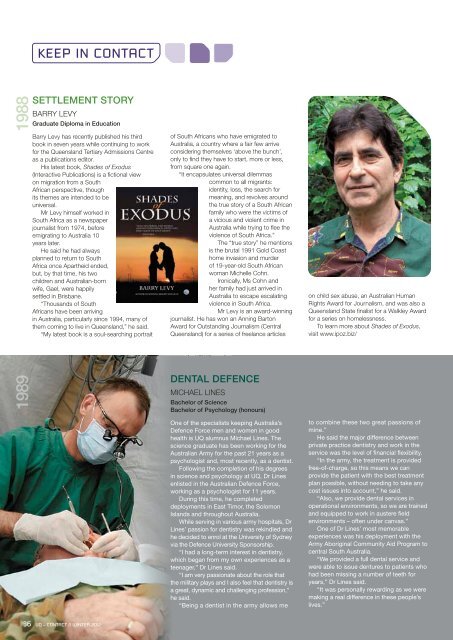
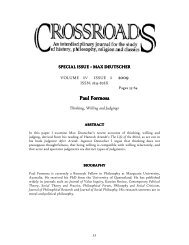
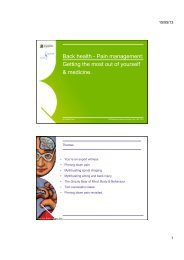
![Recycling [ PDF, 62KB ] - University of Queensland](https://img.yumpu.com/51805185/1/184x260/recycling-pdf-62kb-university-of-queensland.jpg?quality=85)
